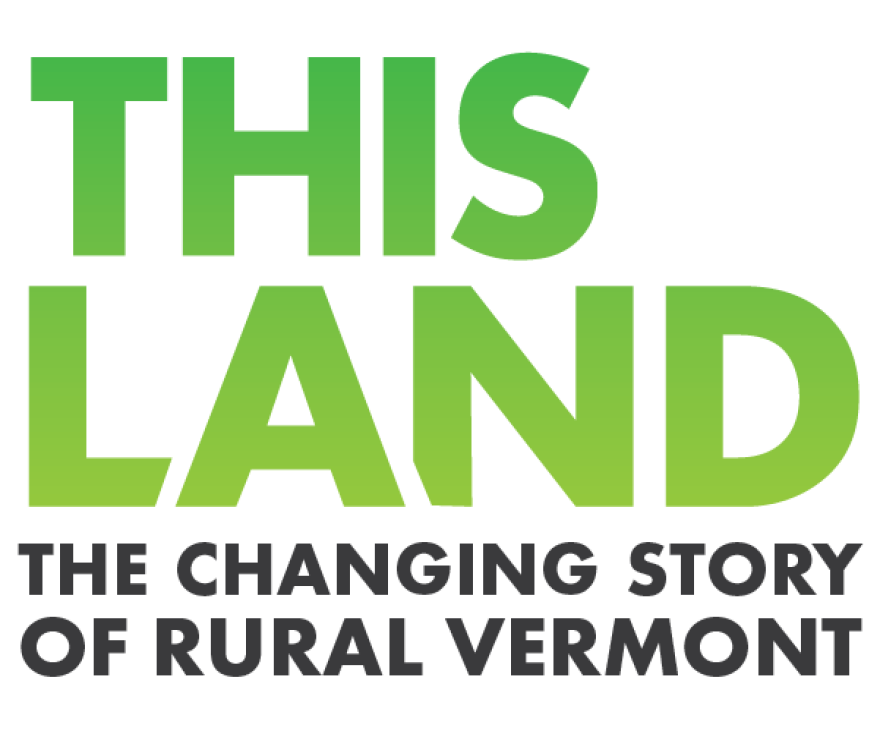Vermonters generally enjoy life in their rural communities, and most say they're optimistic about the future, according to the new Rural Life Survey commissioned by VPR and Vermont PBS. But the poll also reveals stark challenges threatening the future of rural economies that experts say are in a time of "enormous transition."
Life in rural Vermont isn't always easy, but there's a reason the people who live in this state have decided to it home: According to the poll, nearly 80% of Vermonters rate their overall quality of life as either "excellent" or "good."
This survey of 801 Vermonters, conducted between Aug. 26 and Sept. 9, is part of a project by VPR and Vermont PBS called This Land: The Changing Story of Rural Vermont — and the poll suggests that story is complicated.
FULL RESULTS: Explore the 2019 Vermont Rural Life Survey here.
Paul Costello, executive director of the Vermont Council on Rural Development, has spent countless hours in rural communities over the past 20 years, helping local leaders chart their towns' futures.
Costello said the story of rural Vermont is indeed changing. But, he said, this state is no stranger to transition.
"We were a land of pioneers," Costello said. "We were a forest economy that became a potash economy that became a small farm subsistence economy that became a fabric and textile economy, a mill town economy."
Costello said those different waves of economic activity have conditioned the land and conditioned its communities. And now, he said, Vermont finds itself in the midst of yet another transition.
"But in a global context of a global economy," Costello said, "with different kinds of opportunities that threaten local but also give opportunities for creative entrepreneurism and creative community leadership."

According to the Rural Life Survey, Vermonters see the same opportunities Costello does: Two-thirds of respondents say they're either "somewhat optimistic" or "very optimistic" about the future of their community.
But life here isn't all covered bridges and maple creemees. For example, the survey found that:
- 20% of people think access to high-speed internet is a problem.
- 11% say they were unable to access to health care when they needed it.
- 40% of Vermonters say if they had an unexpected expense of $1,000, they'd have trouble paying it right away.
- More Vermonters than not said they'd advise an 18-year-old to leave the state, in order to build a successful life and career.
"Rural Vermont is in a time of enormous transition," said Ted Brady, deputy secretary of the Vermont Agency of Commerce and Community Development. "And when you're going through transition, it's like a midlife crisis, where really rural Vermont's in a mid-life crisis right now."
Monday on Vermont Edition: Parsing The Results Of The Vermont Rural Life Survey
According to the Rural Life Survey, that crisis is particularly acute for Vermonters who lack a college education.
Rich Clark, the professor of political science at Castleton University who directed the survey, said Vermonters’ perceptions about quality of life differ significantly among people with differing levels of education.
"Forty-nine percent of those with a [four-year] college degree said it's 'excellent,' as opposed to only 22% with a high school diploma or less," Clark said.
The poll, which was conducted by Braun Research, has an overall margin of error of 3.5% (though the margin of error varies as different sample subsets are examined).
"I don't want to go so far as to say there are, you know, the two Vermonts," Clark said. "But there's a very different approach to life and a very different feeling about life in rural Vermont if you have money as opposed to if you don't."

Deputy Commerce Secretary Brady said the challenges identified in the poll are real. But Brady, who previously served as director of rural development in Vermont for the U.S. Department of Agriculture, said they're hardly unique to Vermont.
"Recognize that broadband, health care, infrastructure — go down that long list — every single rural community in America, and I'd argue the world, is challenged with that," Brady said.
Brady said he isn't convinced that Vermont can solve these problems on its own, however he said it doesn't need to in order for rural communities to thrive.
"Don't let the Gordian knot stop you from doing something great. ... Don't let the problem, the large national problem, stop you from engaging as a community in solving a smaller problem," Brady said.
And Costello, from the Council on Rural Development, said if the changing story of rural Vermont is going to have a happy ending, then rural communities are going to have to write it.
"Is Washington, D.C., coming to rescue Hardwick? Is the state of Vermont going to come up with an economic development plan for Island Pond? No. Nobody's coming from the outside to set direction for rural communities," Costello said.
Vermonters seem to understand that, too. According to the survey, only 13% of people think state elected officials understand the challenges facing rural Vermont "very well."

This fall, VPR and Vermont PBS are collaborating to present This Land: The Changing Story of Rural Vermont to explore the challenges and opportunities of living in rural Vermont — from health care and education to the economy, housing, workforce training and so much more.
This project was made possible by our supporters, and by AARP Vermont and the Vermont Community Foundation.





